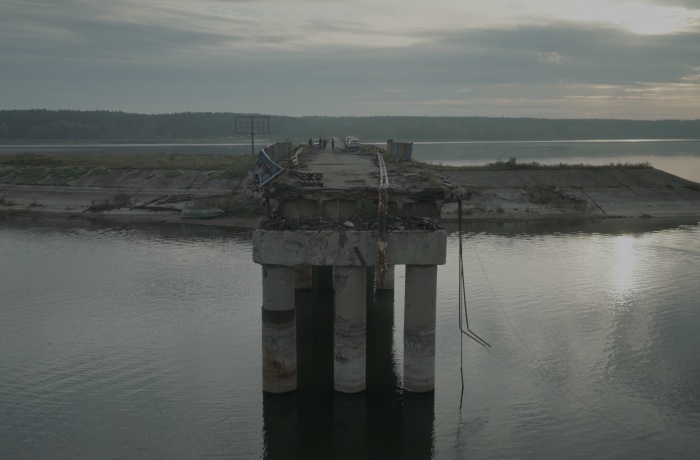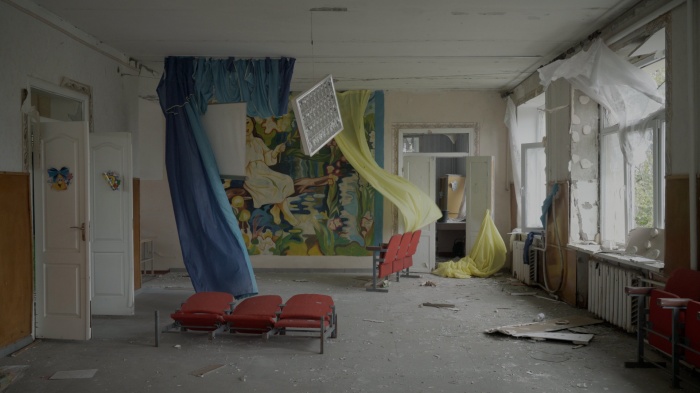
Humanity has a rather complex relationship with history. It’s been imagined in so many different ways – as a straight line of events whose logic is determined by higher forces, as a fixed cycle of the same things over and over, repeating with every sunrise and every spring. Hegel said that history repeats twice: first as tragedy, then as farce; the post-structuralists replied gloomily, as they looked at the present reality: it’s the other way around, it repeats first as someone’s joke and then as a tragedy. History has been rediscovered, rewritten; it has been doubted, it has been argued, it has been turned into a tourism business. History has even been declared over: in the 1990s, after the collapse of the Soviet Union, Francis Fukuyama looked with hope into a future in which there would be no global wars, and thus history as a series of ideological confrontations was thought to have ended. Spoiler alert: Fukuyama was later called the futurologist who was wrong about everything.
In a way, we are lucky to live in a time when all these controversial views and attitudes towards history are often boiling in the same pot. Ukraine has become the place which reveals simultaneously the repetitiveness of history and its unlearned lessons, a distorted cosplay of the tragedies of the past, someone’s jokes that turn into historic choices, the historic continuity of struggle, and the complete absence of any determination or historic guarantees for the future, apart from everyone’s own responsibility to build this future with their own efforts. “Never again!” cried some people for decades after the Second World War. “But it is already happening again,” we said when Russian missiles were launched at Ukraine. “The war has been going on for two years,” some say. “Ten years,” others remark. Historians sigh and count the centuries. How do we avoid losing historical memory in all these layers? How do we build the future, bring the Russian invaders to responsibility, and ensure a new security architecture for ourselves?
Films, of course, cannot provide answers to all these questions, and they don’t have to. But they can help us highlight the essential trajectories which various events can take and in which we ourselves can develop; they can help us outline the important areas wherein we should focus our attention, discussions, and efforts. In this year’s central thematic programme, we have tried to combine these areas and dimensions, contemplating the culture of memory in the face of war and the global fragility of the world.
This conversation is opened by a film which seeks to capture the coordinates in which the Russian-Ukrainian war unfolds: Intercepted by Oksana Karpovych. It is not as much about geopolitical reasons as about what is going on in the heads of Russians who decide to go and kill Ukrainians. The intercepted phone conversations between Russian soldiers in Ukrainian trenches and their families could sober up anyone who may still believe or hope that the invaders lack awareness of what they are doing. Arguments about Kremlin propaganda and forced mobilisation end exactly where Russian citizens boast to their wives or mothers about the scale on which they loot Ukrainian apartments, steal tracksuits, rape women, torture men, kill mothers in front of their children. These crimes become a point of pride, because their foundation is the banal, sky-high chauvinism which even their speech is saturated with. However, within these coordinates, the director also notices the dynamic with which the euphoria along the lines of ‘To Kyiv in three days!’ dissipates — first with shock when it turns out that the ‘second-best army in the world’ is also mortal, and then with the realisation that there is nothing good about war. But even this is only followed, at best, by an impenetrable chauvinistic desire to have revenge on Ukrainians for the Russian occupiers that have already been killed.
A still from the film Intercepted
As we listen to these interceptions and watch the masterful footage of the consequences of violence brought to Ukrainian daily life by Russia, we recall Hannah Arendt’s statement that no dictatorship can be a justification for the broader masses who tolerate the crimes of their government. No dictatorship can justify the extreme chauvinism — either for the broader public whose members take up arms and go to kill Ukrainians, or for the cultural elite who have allowed this collapse.
It is striking how Arendt’s work, which was so thorough in the consideration of the disaster of the Second World War, is becoming relevant today, but in a new way. Here we can be tempted to conclude that humanity has learned nothing, and even when we have so many books, attempts to make sense of history, and conclusions, we still continue to fall into the same traps. This is probably true to a certain extent. However, the honest thing to do is always start with yourself. The film The Kyiv Files by Walter Stokman raises the question of one’s own responsibility under dictatorship by tackling the period when Ukraine was under the system of Soviet totalitarianism. The Dutch director became interested in the KGB archives which were finally published in 2017. As he dives into these documents, Stokman discovers not only the solid dome of state surveillance over seemingly ordinary people, but also the degree of complicity in crimes which those same ordinary people sometimes agreed to. Decades after these events, the filmmaker searches for the people involved in some archival documents, and even a former security officer, in order to recall the details of those cases; and no less importantly, to ask those of them who acted in support of this total surveillance what drove them to do it. From ‘It was just a job’ to ‘What could I do? it was impossible to refuse’ — these claims cannot be called selfless, but they certainly don’t deserve to be trivialised.
A still from the film The Kyiv Files
Stokman’s film invites us to a difficult but extremely important conversation about personal responsibility from the historic perspective — responsibility for action and inaction, for struggle and conformism, for self-sacrifice and complicity. There was no punishment for the crimes of the Soviet Union; and that, in particular, made it possible for the Kremlin to speak about Ukraine’s ‘non-existence’ for such a long time. However, no critical consideration of the Soviet period, or should we say, the internalisation of that lesson of history, is possible without a dialogue within society, or without giving an honest answer to the questions about personal responsibility — about ‘who wrote the four million secret reports?’, and who helped the KGB to watch people even in their bedrooms.
From practically the other end of the world, we hear similar thoughts about personal responsibility in the context of a historic struggle for existence. Invisible Nation by Vanessa Hope depicts the ideological and political reality of Taiwan as it faces military threat from China. As the nation stands on the edge of an abyss, which feels so familiar for Ukraine, the confrontation is also between fundamentally different systems and visions of the future. In contrast to Beijing’s authoritarianism, Taipei’s political elites have invested a great deal of effort in preserving democracy as they follow their own path in a situation of ever more severe diplomatic isolation. Hope’s camera follows the country’s president, who is balancing inside a rather fragile reality, and continues to defend the sovereignty of the Chinese Republic and Taiwan’s historic right to be seen as the main representative and have jurisdiction over mainland China. In this political battle around historic memory, we can hear an echo of Russia’s full-scale invasion in Ukraine, which brings the issue of global security architecture to the surface.
A still from the film Invisible Nation
The only film in this programme that doesn’t seem at first glance to focus directly on a specific military conflict is Henry Fonda for President by Alexander Horwath. But that is exactly what its magic trick is about. If you are not familiar with the filmography of the famous American actor Henry Fonda, don’t worry: this film is not what it seems, and it is not a formal portrait along the lines of ‘the lives of interesting people.’ Although Horwath will, of course, tell you everything you need to know about Fonda during this journey of several hours. In the end, this film is more of an impressively painstaking deconstruction of how cinema can shape our ideas about our history and ourselves. It is no accident that Horwath’s narrative begins in the 1980s, when former actor Ronald Reagan becomes President of the United States and when Fonda is working on his last film. Both masters of screen portrayals, at this moment Reagan and Fonda curiously embody two opposite views of history, the role and the future of the United States — either as a ‘blessed land’ or as a stage for social struggle. One of these actors promotes his vision through a political career, and the other becomes a sociopolitical phantasm himself, an image that is formed among the millions-strong audience of film screens.
A still from the film Henry Fonda for President
Using Henry Fonda’s example, Horwath demonstrates that cinema can create striking images which eventually replace actual historic experience in public memory, and can even shape society’s own ideas about itself. The magic which happens to the culture of memory does not always remain an innocuous soap bubble. The way we are so easily prepared to reject actual experience for the sake of an elusive image from the screen can eventually cause the formation of a new reality which is not always pleasant. Horwath leads us on a long path from the processes of relocation from Holland to the Northern American lands in the 17th century, to the age of the Great Depression, the Second World War, the nuclear bombing of Hiroshima and Nagasaki, the Cold War and the Vietnam War, and so on. And all these destinations will, in one way or another, reflect thoughts about the culture of memory and about the role that cinema plays in it.
A still from the film Mission 200
The DNA of Dignity by Jan Baumgartner and Mission 200 by Volodymyr Sydko turn the conversation about the culture of memory in the face of war towards the complex question of preservation — sometimes physical, sometimes not — of memory. How do we save the dead from oblivion? The protagonist of Mission 200 is Tetiana Pototska. Like many Ukrainians, before 2022 she had a civilian job in tourism. At the beginning of the full-scale invasion, Tetiana bought a minibus with her own money and got to work transporting the defenders who were killed in action from eastern regions to their hometowns in the west of Ukraine. Her trips often begin with the search for and identification of bodies, and they end with driving in a mourning convoy along city streets lined with local residents who kneel to honour the memory of the fallen defenders. “When people say ‘cargo 200,’ I get very angry,” says Tetiana. “What do you mean, cargo? Who was the moron that came up with this name?” The culture of memory during war is often, unfortunately, about the possibility of burying the dead with honour — and language is also affected by this desire. Words matter. At the same time, even as she faces death and grief every day, Tetiana tries even harder to bring the warmth of life back to the people around her. Her example is a striking story about how one can contribute personally to the preservation of memory and the aspiration to build the future, no matter how hard it is to do.
A still from the film The DNA of Dignity